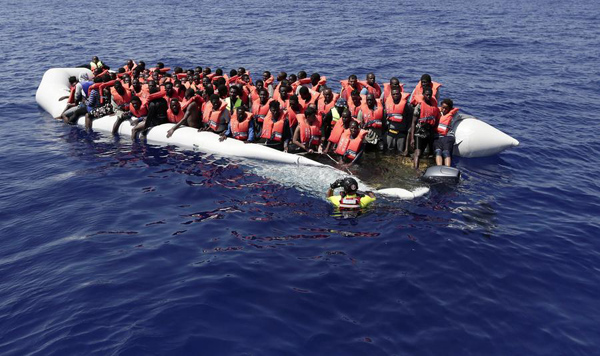Resolving the refugee crisis
Updated: 2016-09-21 07:41
(China Daily)
|
||||||||
 |
|
Migrants are rescued during a MOAS operation off the coast of Libya August 18, 2016 in this handout picture courtesy of the Italian Red Cross released on August 19, 2016. Picture taken August 18, 2016. [Photo/Agencies] |
As the refugee crisis, caused mainly by Syria's civil war and conflicts in Iraq and Afghanistan, continues, governments across the world need to realize that only concerted global efforts can resolve it.
At the United Nations Summit for Refugees and Migrants on Monday, world leaders approved a declaration aimed at responding to the needs of refugees worldwide in a more coordinated and humane manner. But Western countries, especially the United States that is largely responsible for the war and conflicts, need to take the lead in addressing the refugee crisis, because their policies and actions in those regions are squarely to blame for the exigency.
Syria's civil war, for instance, has forced more than 4.8 million people to seek shelter in neighboring countries and regions, especially Europe, and it seems the violence will continue as the weeklong Russia-US brokered truce ends on Monday.
Moreover, the measures adopted by rich countries to limit the number of refugees have fostered similar policies in regions that have traditionally welcomed innumerable refugees, according to Britain-based Overseas Development Institute. For example, Jordan refuses to receive about 70,000 Syrians stranded in the desert and Kenya plans to close the Dadaab refugee camp and repatriate its largely Somali refugees.
China believes ending the wars, restoring social stability and promoting economic development are critical to resolving the refugee crisis. And Premier Li Keqiang told the UN summit that China will provide $100 million in additional humanitarian aid to deal with the problems created by the massive movement of refugees and migrants.
Besides, China has been investing in countries in Africa, the Middle East and Asia, in order to promote local economic development, create jobs, alleviate poverty and thus reduce local residents' pressure to leave home.
Since no country can stay immune to the global refugees crisis, the international community needs to act urgently and strongly to more effectively respond to the issue.
Most Viewed
Editor's Picks

|

|

|

|

|

|
Today's Top News
Trump outlines anti-terror plan, proposing extreme vetting for immigrants
Phelps puts spotlight on cupping
US launches airstrikes against IS targets in Libya's Sirte
Ministry slams US-Korean THAAD deployment
Two police officers shot at protest in Dallas
Abe's blame game reveals his policies failing to get results
Ending wildlife trafficking must be policy priority in Asia
Effects of supply-side reform take time to be seen
US Weekly

|

|
















